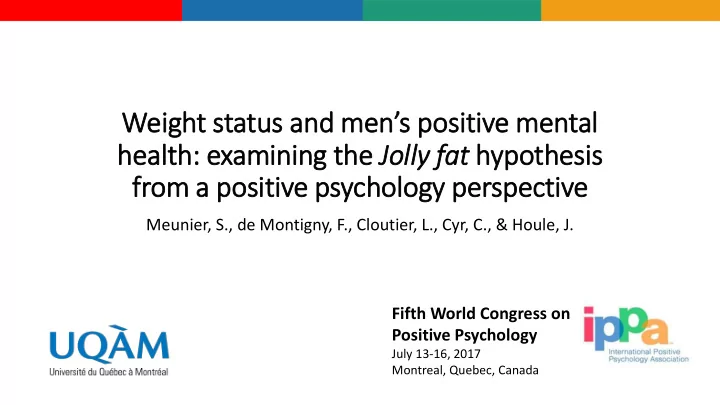

Weight status and men’s positive mental health: : examining the Joll lly fat hypothesis fr from a posit itive psychology perspective Meunier, S., de Montigny, F., Cloutier, L., Cyr, C., & Houle, J. Fifth World Congress on Positive Psychology July 13-16, 2017 Montreal, Quebec, Canada
Background • The “ Jolly fat ” hypothesis • Adults (especially men) with overweight or obesity are at lower risk of anxiety and depression. (Crisp & McGuiness, 1976; Crisp, Queenan, Sittampaln & Harris, 1980) • Studies testing the association between weight status and mental health • …have given inconsistent results • …have mainly focused on mental illness (e.g. depression) rather than on positive mental health. • The association between weight status and men’s positive mental health (emotional, psychological, and social well-being) has seldom been investigated.
Objectives • Examine the association between weight status and men’s positive mental health. • Explore the moderating effect of marital status in this association.
Methods • Cross-sectional study (n= 645) • Self-reported questionnaire • Body mass index (BMI) = Weight (kg)/ height (m 2 ) • Marital status: 0=single; 1=married or common-law partner • Positive mental health: Mental health continuum short form (Lamers et al., 2011)
Results Normal weight Overweight Obesity F p Mean (SD) Mean (SD) Mean (SD) Emotional well-being 3.86 (0.98) 3.98 (0.81) 3.88 (0.94) 1.22 .30 Psychological well-being 3.64 (0.91) 3.77 (0.83) 3.58 (1.02) 2.47 .09 Social well-being 2.43 (1.18) 2.57 (1.10) 2.41 (1.22) 1.34 .26
Results Emotional well-being Psychological well-being Social well-being B SEB β B SEB β B SEB β (Constant) VI=Obesity 3.84 0.30 3.87 0.33 1.26 0.42 VI=Overweight VI=Obesity Age 0.00 0.00 .01 0.00 0.00 -.04 0.01 0.00 .07 Single men Single men Single men Years of education -0.02 0.02 -.04 -0.01 0.02 -.01 0.08 0.03 .13** β = -.25, p < .01 β = .17, p = .05 β = -.17, p = .06 Perceived economic status -0.69 0.11 -.23** -0.44 0.12 -.14** -0.47 0.16 -.12** (poor or very poor) Men in a Men in a Men in a relationship Number of comorbidities -0.16 0.03 -.24** -0.10 0.03 -.14** -0.15 0.04 -.17** relationship relationship: β = .02, p = .73 Marital status 0.65 0.14 .31** 0.23 0.15 .11 0.10 0.19 .04 β = -.04, p = .42 β =.03, p = .58 Overweight 0.39 0.15 .22* 0.09 0.16 .05 0.13 0.21 .06 Obesity -0.08 0.20 -.04 -0.72 0.21 -.33** -0.56 0.28 -.20* Overweight X marital status -0.46 0.17 -.25* -0.03 0.19 -.02 -0.10 0.24 -.04 Obesity X marital status 0.06 0.23 .03 0.76 0.24 .33** 0.65 0.31 .22*
Conclusions • Overall, men in normal weight, overweight, and obesity categories did not differ significantly in their levels of emotional, psychological, and social well-being. • Marital status is an important variable to consider when examining the association between weight status and men’s positive mental health.
Thank you! Questions? meunier.sophie@uqam.ca
Recommend
More recommend